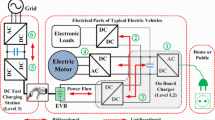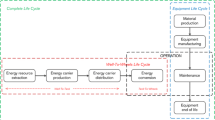Abstract
With the development of electric vehicle (EV), there is a huge demand for electric vehicle charging station (EVCS). The utilization of renewable energy sources (RES) in EVCS can not only decrease the energy fluctuation by participating in peakload reduction of the grid, but also reduce the pollution to the environment by cutting down the use of fossil fuels. In this paper, the optimal planning for grid-connected EVCS with RES is studied by considering EV load uncertainty. Nine scenarios are set based on a different characteristic of EV load to reveal the impact of EV load on net present cost (NPC) and to express the relationship between optimal capacity and energy flow. Moreover, since electricity price also plays an important role in EVCS planning, an economic comparison between different cases with different electricity price for peak-valley-flat period is carried out. The results reveal the economic benefits of applying RES in EVCS, and demonstrate that EV load with different characteristics would influence the capacity of each device (PV, battery, converter) in the EVCS optimal planning.
Similar content being viewed by others
References
Huang Z, Fang B, Deng J. Multi-objective optimization strategy for distribution network considering V2G-enabled electric vehicles in building integrated energy system. Prot Control Mod Power Syst, 2020, 5: 48–55
Cui Q S, Bai X M, Dong W J. Collaborative planning of distributed wind power generation and distribution network with large-scale heat pumps. CSEE J Power Energy Syst, 2019, 5: 335–347
Li J H, Zhu M S, Huang Y J. Classification and location scheme selection of coupling components in integrated electrical and heating systems with renewable energy. CSEE J Power Energy Syst, 2020, 6: 619–629
Ning P, Li H, Huang Y, et al. Review of power module automatic layout optimization methods in electric vehicle applications. Chin J Electr Eng, 2020, 6: 8–24
Richardson D B. Electric vehicles and the electric grid: A review of modeling approaches, impacts, and renewable energy integration. Renew Sustain Energy Rev, 2013, 19: 247–254
Zeng Y W, Li J, Zhou J, et al. Electric vehicle charging infrastructure planning (in Chinese). Electr Technol, 2020, 9: 30–33
Murty V V S N, Kumar A. Multi-objective energy management in microgrids with hybrid energy sources and battery energy storage systems. Prot Control Mod Power Syst, 2020, 5: 2
Ding Y J. Microgrid model with renewable energy and energy storage system and its optimal operation simulation (in Chinese). Chinese J Electr Eng, 2020, 15: 36–40
Mehrjerdi H. Dynamic and multi-stage capacity expansion planning in microgrid integrated with electric vehicle charging station. J Energy Storage, 2020, 29: 101351
Zeng B, Dong H, Xu F, et al. Bilevel programming approach for optimal planning design of EV charging station. IEEE Trans Ind Applicat, 2020, 56: 2314–2323
Shaaban M F, El-Saadany E F. Accommodating high penetrations of PEVs and renewable DG considering uncertainties in distribution systems. IEEE Trans Power Syst, 2014, 29: 259–270
Zhang H, Moura S J, Hu Z, et al. Joint PEV charging network and distributed PV generation planning based on accelerated generalized benders decomposition. IEEE Trans Transp Electrific, 2018, 4: 789–803
Clairand J M, Arriaga M, Canizares C A, et al. Power generation planning of Galapagos’ microgrid considering electric vehicles and induction stoves. IEEE Trans Sustain Energy, 2019, 10: 1916–1926
Gunter S J, Afridi K K, Perreault D J. Optimal design of grid-connected PEV charging systems with integrated distributed resources. IEEE Trans Smart Grid, 2013, 4: 956–967
Barote L, Marinescu C. Li-ion energy storage capacity estimation in residential applications with EV. In: Proceedings of the 8th International Conference on Renewable Energy Research and Applications. Brasov, 2019. 326–330
Hafez O, Bhattacharya K. Optimal design of electric vehicle charging stations considering various energy resources. Renew Energy, 2017, 107: 576–589
HOMER® Pro Version 3.14.2 User Manual. https://www.homerenergy.com/products/pro/docs/index.html
Boonraksa T, Mmary E R, Marungsri B. Optimal design of charging station for electric vehicles integrated with renewable DG. In: Proceedings of the 2nd International Conference on Electrical Engineering and Automation. Chengdu, 2018. 82–85
Drive-4-Data University of Waterloo. https://wise.uwaterloo.ca/drive4data
HOMER Energy. http://www.homerenergy.com
NASA surface meteorology and solar energy. https://asdc.larc.nasa.gov
Huo G T. Personal library (in Chinese). http://www.360doc.com/content/19/0916/12/64113653_861360170.shtml
Liu B X. China energy storage (in Chinese). http://www.escn.com.cn/news/show-1053235.html
small_8.html URL }
Li C, Huang S T, Zhao X F, et al. Economic study on cascade utilization of batteries in photovoltaic energy storage (in Chinese). Shanghai Energy Conserv, 2020, 11: 1247–1254
Stevanoni C, de Greve Z, Vallee F, et al. Long-term planning of connected industrial microgrids: A game theoretical approach including daily peer-to-microgrid exchanges. IEEE Trans Smart Grid, 2019, 10: 2245–2256
Author information
Authors and Affiliations
Corresponding author
Rights and permissions
About this article
Cite this article
Long, Y., Li, Y., Wang, Y. et al. Impact of EV load uncertainty on optimal planning for electric vehicle charging station. Sci. China Technol. Sci. 64, 2469–2476 (2021). https://doi.org/10.1007/s11431-021-1897-x
Received:
Accepted:
Published:
Issue Date:
DOI: https://doi.org/10.1007/s11431-021-1897-x




